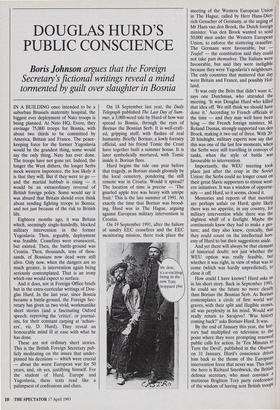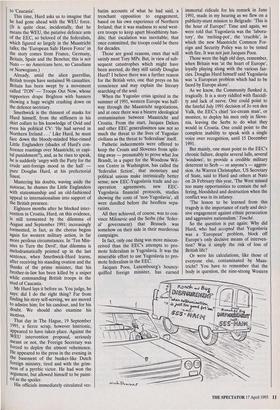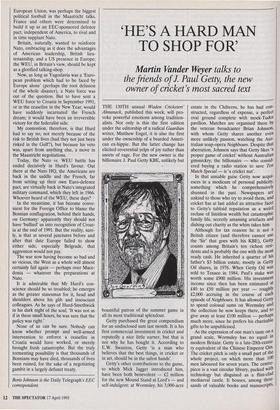DOUGLAS HURD'S PUBLIC CONSCIENCE
Boris Johnson argues that the Foreign
Secretary's fictional writings reveal a mind tormented by guilt over slaughter in Bosnia
IN A BUILDING once intended to be a suburban Brussels maternity hospital, the biggest ever deployment of Nato troops is being planned. At Nato HQ, Evere, they envisage 75,000 troops for Bosnia, with about two thirds to be committed by America, Britain and France. The peace- keeping force for the former Yugoslavia would be the grandest thing, some would say the only thing, Nato has ever done. The troops have not gone yet. Indeed, the longer the West dithers, the longer Serbs mock western impotence, the less likely it is that they will. But if they were to go and the martial hubbub is rising — it would be an extraordinary reversal of British foreign policy. Some would say it was absurd that Britain should even think about sending fighting troops to Bosnia; and not just because of the risk to British life.
Eighteen months ago, it was Britain which, seemingly single-handedly, blocked military intervention in the former Yugoslavia. Then, arguably, deployment was feasible. Ceasefires were evanescent, but existed. Then, the battle-ground was Croatia. Then, thousands, tens of thou- sands, of Bosnians now dead were still alive. Only now, when the dangers are so much greater, is intervention again being seriously contemplated. That is an irony which one would expect to surface.
And it does, not in Foreign Office briefs but in the extra-curricular writings of Dou- glas Hurd. In the last year, since Bosnia became a battle-ground, the Foreign Sec- retary has given us two vivid, workmanlike short stories (and a fascinating Oxford speech, reproving the 'critics', or journal- ists, for their constant carping at 'achiev- ers', viz. D. Hurd). They reveal an honourable mind ill at ease with what he has done.
These are not ordinary short stories. This is the British Foreign Secretary pub- licly meditating on the issues that under- pinned his decisions — which were crucial — about the worst European war for 50 years, and, oh yes, justifying himself. For the student of Hurd, Europe and Yugoslavia, these texts read like a palimpsest of confessions and clues. On 18 September last year, the Daily Telegraph published The Last Day of Sum- mer, a 3,000-word tale by Hurd of how war spread to Bosnia, through the eyes of Borisav the Bosnian Serb. It is well-craft- ed, gripping stuff, with flashes of real humanity. Briefly: Borisav, a lowly forestry official, and his friend Tomic the Croat have together built a summer house. It is later symbolically mortared, with Tomic inside it. Borisav flees.
Hurd begins the tale one year before that tragedy, as Borisav stands gloomily by the local cemetery, pondering the still remote war in Croatia. Would it spread? The location of time is precise — 'The gnarled apple tree was heavy with unripe fruit.' This is the late summer of 1991. At exactly the time that Borisav was brood- ing, Hurd was in The Hague, arguing against European military intervention in Croatia.
On 19 September 1991, after the failure of sundry EEC ceasefires and the EEC monitoring mission, there took place the meeting of the Western European Union in The Hague, called by Herr Hans-Diet- rich Genscher of Germany, at the urging of Mr Hans van den Broek, the Dutch foreign minister. Van den Broek wanted to send 50,000 men under the Western European Union, to enforce the stuttering ceasefire. The Germans were favourable, but — Teufel.' — the constitution said they could not take part themselves. The Italians were favourable, but said they were ineligible because they were Yugoslavia's neighbours. The only countries that mattered that day were Britain and France, and possibly Hol- land.
`It was only the Brits that didn't want it,' says one Dutchman, who attended the meeting. 'It was Douglas Hurd who killed that idea off. We still think we should have done it.' According to French officials at the time — and they may well have been lying — the French foreign minister, M. Roland Dumas, strongly supported van den Broek, making it two out of three. With 20- 20 hindsight, military experts now say that this was one of the last few moments, when the Serbs were still travelling in convoys of tanks, when the style of battle was favourable to intervention.
Importantly, the WEU meeting took place just after the coup in the Soviet Union: the Serbs could no longer count on their great Slavic supporters to stymie west- ern initiatives. It was a window of opportu- nity — and Hurd, so it seems, closed it.
Memories and reports of that meeting are perhaps unfair on Hurd; quite likely there was no appetite, in any country, for military intervention while there was the slightest whiff of a firefight. Maybe the continentals knew they had to make a ges- ture; and they also knew, cynically, that they could count on the intellectual hon- esty of Hurd to bat their suggestions aside.
And yet there will always be that element of historical doubt: not just whether the WEU option was really feasible, but whether it was right, in view of what was to come (which was hardly unpredicted), to close it off.
How could I have known? Hurd asks us in his short story. Back in September 1991, he could see the future no more clearly than Borisav the Bosnian Serb. As Borisav contemplates a circle of first world war graves, with their split and illegible stones, all was perplexity in his mind. Would war really return to Sarajevo? 'Was history coming back?' asks Borisav-Hurd. It was.
By the end of January this year, the hor- rors had multiplied on television to the point where they were prompting renewed public calls for action. In 'Ten Minutes to Turn the Devil', published in the Observer on 31 January, Hurd's conscience drives him back to the theme of the European intervention force that never was. This time the hero is Richard Smethwick, the British defence secretary, who must convince a mutinous Brighton Tory party conference of the wisdom of having sent British troops to `Caucasia'.
This time, Hurd asks us to imagine that he had gone ahead with the WEU force. (It is quite clear, incidentally, that he means the WEU, the putative defence arm of the EEC, so beloved of the federalists, which figured so largely in the Maastricht talks; the 'European Safe Haven Force' in the story comes from France, Germany, Britain, Spain and the Benelux; this is not Nato — no Americans here, no Canadians or Norwegians.) Already, amid the alien guerrillas, British troops have sustained 96 casualties. Britain has been swept by a movement called 'TON' — Troops Out Now, whose supporters drape Brighton with banners showing a huge weight crashing down on the defence secretary.
Smethwick is the thinnest of masks for Hurd himself, from the stiffeners in his shirt collars to his knowledge of Ovid and even his political CV: 'He had served in Northern Ireland . . .' Like Hurd, he must face down the bloody-minded blue-rinsed Little Englanders (shades of Hurd's con- ference roastings over Maastricht, or capi- tal punishment?), and, as he rises to speak, he is suddenly 'angry with the Party for the crude anti-foreign mood in the hall' pure Douglas Hurd, at his prefectorial finest.
Mastering his doubts, waving aside the autocue, he shames the Little Englanders With statesmanship and an old-fashioned appeal to internationalism into support of the British presence.
Eighteen months after he blocked inter- vention in Croatia, Hurd, on this evidence, is still tormented by the dilemma of August and September 1991; increasingly tormented, in fact, as the chorus begins again for western military action, in far more perilous circumstances. In 'Ten Min- utes to Turn the Devil', that dilemma is melodramatically pointed up in the last sentence, when Smethwick-Hurd learns, after receiving his standing ovation and the thanks of the prime minister, that his brother-in-law has been killed by a sniper while commanding British troops in the mud of Caucasia.
Mr Hurd lays it before us. You judge, he says: did I do the right thing? Far from finding his story self-serving, we are moved to admire him; for his candour, and for his doubt. We should also examine his motives.
That day in The Hague, 19 September 1991, a fierce scrap, however histrionic, appeared to have taken place. Against the WEU intervention proposal, seriously meant or not, the Foreign Secretary was forced to deploy the utmost vehemence. He appeared to the press in the evening in the basement of the bunker-like Dutch foreign ministry, tired and with the grim- ness of a pyrrhic victor. He had won the argument, but allowed himself to be paint- ed as the spoiler. His officials immediately circulated ver- batim accounts of what he had said, a trenchant opposition to engagement, based on his own experience of Northern Ireland; that it was madness to send west- ern troops to keep apart bloodthirsty ban- dits; that escalation was inevitable; that once committed, the troops could be there for decades.
Those are good reasons, ones that will satisfy most Tory MPs. But, in view of sub- sequent catastrophes which might have been averted, do they still satisfy Douglas Hurd? I believe there was a further reason for the British veto, one that preys on his conscience and may explain the literary searching of the soul.
When the Yugoslav crisis ignited in the summer of 1991, western Europe was half- way through the Maastricht negotiations, and at once there was a bizarre ideological contamination between Maastricht and Croatia. From the start, Jacques Delors and other EEC generalissimos saw not so much the threat to the lives of Yugoslav civilians as the threat to 'federalism' itself.
Pathetic inducements were offered to keep the Croats and Slovenes from split- ting away — presumably to prove what Joe Brandt, in a paper for the Woodrow Wil- son Centre in Washington, has called the `federalist fiction', that monetary and political unions make intrinsically better sense; new EEC-Yugoslavia trade and co- operation agreements, new EEC- Yugoslavia financial protocols, studies showing the costs of 'non-Yugoslavia', all were dandled before the heedless sepa- ratists.
All they achieved, of course, was to con- vince Milosevic and the Serbs (the 'feder- al' government) that Brussels was somehow on their side in their murderous campaigns. In fact, only one thing was more miscon- ceived than the EEC's attempts to pro- mote federalism in Yugoslavia. It was the miserable effort to use Yugoslavia to pro- mote federalism in the EEC.
Jacques Poos, Luxembourg's bouncy- quiffed foreign minister, has earned immortal ridicule for his remark in June 1991, made in my hearing as we flew on a publicity-stunt mission to Belgrade: 'This is the hour of Europe!' Time and again, we were told that Yugoslavia was the 'labora- tory', the 'melting-pot', the 'crucible', in which the new Maastricht Common For- eign and Security Policy was to be tested with fire. It was not just Jacques Poos.
Those were the high old days, remember, when Britain was 'at the heart of Europe', loyally playing along with the various fan- cies. Douglas Hurd himself said Yugoslavia was 'a European problem which had to be faced by Europe alone'.
As we know, the Community flunked it, tragically. It is a story riddled with flaccidi- ty and lack of nerve. One could point to the fateful July 1991 decision of Jo yen den Valk, the EEC's chief 'ice-cream man', or monitor, to deploy his men only in Slove- nia, leaving the Serbs to do what they would in Croatia. One could point to the complete inability to speak with a single voice over recognition, until 15 December 1991.
But mainly, one must point to the EEC's chronic failure, despite several lulls, several `windows', to provide a credible military deterrent to Serb — or anyone's — aggres- sion. As Warren Christopher, US Secretary of State, said to Hurd and others at Nato on 26 February this year, 'The West missed too many opportunities to contain the suf- fering, bloodshed and destruction when the conflict was in its infancy.
`The lesson to be learned from this tragedy is the importance of early and deci- sive engagement against ethnic persecution and aggressive nationalism.' Touché.
So the question is put again: Why did Hurd, who had accepted that Yugoslavia was a 'European' problem, block off Europe's only decisive means of interven- tion? Was it simply the risk of loss of British life?
Or were his calculations, like those of everyone else, contaminated by Maas- tricht? You have to remember that the body in question, the nine-strong Western European Union, was perhaps the biggest political football in the Maastricht talks. France and others were determined to build it up as an EEC-sponsored defence pact, independent of America, to rival and in time supplant Nato.
Britain, naturally, wanted to reinforce Nato, embracing as it does the advantages of American leadership, British lieu- tenantship, and a US presence in Europe; the WEU, in Britain's view, should be kept as a glorified talking-shop.
Now, as long as Yugoslavia was a 'Euro- pean problem which had to be faced by Europe alone' (perhaps the root delusion of the whole disaster), a Nato force was out of the question. But to have sent a WEU force to Croatia in September 1991, or in the ceasefire in the New Year, would have suddenly incarnated the French dream; it would have been an irreversible victory for the federalist side.
My contention, therefore, is that Hurd had to say no, not merely because of the risk to British lives (had they not just been risked in the Gulf?), but because his veto was, apart from anything else, a move in the Maastricht negotiations.
Today, the Nato vs. WEU battle has ended decisively in Hurd's favour. Out there at the Nato HQ, the Americans are back in the saddle and the French, far from setting up their own Euro-defence pact, are virtually back in Nato's integrated military command, which they left in 1966. Whoever heard of the WEU, these days?
In the meantime, it has become conve- nient for the Foreign Office to blame the Bosnian conflagration, behind their hands, on Germany: apparently they should not have 'bullied' us into recognition of Croat- ia at the end of 1991. But the reality, sure- ly, is that at several junctures before and after that date Europe failed to show either side, especially Belgrade, that aggression would not pay.
The war now having become so bad and so vicious, the West as a whole will almost certainly fail again — perhaps over Mace- donia — whatever the preparations at Nato.
It is admirable that Mr Hurd's con- science should be so troubled; he emerges as the greater statesman for it, head and shoulders above his glib and insouciant colleagues. As he says of Hurd-Smethwick in his dark night of the soul, 'It was not as if in these small hours, he was sure that the policy was right.'
None of us can be sure. Nobody can know whether prompt and well-armed intervention to enforce a ceasefire in Croatia would have worked, or merely brought fresh catastrophe. But the truly tormenting possibility is that thousands of Bosnians may have died, thousands of lives been ruined, for the sake of a negotiating gambit in a largely defunct treaty.
Boris Johnson is the Daily Telegraph's EEC correspondent.




















































 Previous page
Previous page